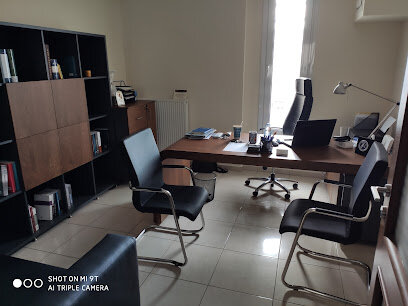Best Antitrust Litigation Lawyers in Xanthi
Share your needs with us, get contacted by law firms.
Free. Takes 2 min.
List of the best lawyers in Xanthi, Greece
About Antitrust Litigation Law in Xanthi, Greece
Antitrust litigation concerns disputes about anti-competitive behavior - for example cartels, abuse of a dominant position, unfair vertical restraints, price-fixing, market allocation and bid-rigging. In Greece these matters are governed by national competition law and by European Union competition rules. Enforcement and administrative investigations are generally handled by the Hellenic Competition Commission, while private enforcement - claims for damages or injunctive relief - is brought in the national courts. Although Xanthi is a regional city in northeastern Greece with local courts and lawyers, many complex antitrust cases are dealt with specialist counsel and administrative authorities located in Athens. If you suspect anti-competitive conduct affecting your business or consumers in Xanthi, you can pursue administrative complaints, criminal referrals in limited circumstances, or private civil claims.
Why You May Need a Lawyer
Antitrust matters are legally and factually complex. You may need a lawyer if you face any of the following situations:
- You are a business accused of anti-competitive conduct and face an Hellenic Competition Commission investigation, fines or orders.
- You suspect competitors have formed a cartel or engage in price-fixing, market sharing or bid-rigging that harms your business.
- You are a supplier or buyer subject to unfair vertical restraints such as resale price maintenance or exclusionary agreements.
- You want to bring a private damages claim for losses caused by anti-competitive conduct.
- You received an inspection notice or a dawn-raid request from competition authorities and need immediate procedural and strategic advice.
- You need help negotiating settlements, leniency applications, or transitional measures following an administrative decision.
Specialist antitrust lawyers advise on procedural rights, evidence preservation, strategic filing choices, liaison with the Hellenic Competition Commission and representation in civil and administrative courts. Timely legal advice can protect rights, limit fines, and preserve the ability to secure or defend damages claims.
Local Laws Overview
Key legal aspects relevant in Xanthi reflect the interplay between Greek competition law and EU competition rules:
- Legal framework - Greek competition law implements EU rules and sets out prohibitions on anti-competitive agreements and abuse of dominance. The national law applies alongside Articles 101 and 102 of the Treaty on the Functioning of the European Union, which apply directly.
- Enforcement authority - The Hellenic Competition Commission is the competent administrative authority for investigations, dawn raids, fines and corrective orders. It operates as an independent administrative body and issues decisions that can be appealed to the administrative courts.
- Private enforcement - Injured parties may bring civil claims for damages or seek interim measures before national courts. Procedures for access to evidence take into account EU rules designed to enable private actions following competition infringements.
- Leniency and settlement - Greece provides procedures for leniency and cooperation that can reduce sanctions for participants in cartels who cooperate with investigators. Settlement procedures may also exist for faster resolution of administrative cases.
- Remedies and sanctions - Administrative sanctions can include fines proportionate to turnover, cease-and-desist orders and behavioural or structural remedies. Private remedies can include compensation for harm, restitution and injunctions.
- Procedural considerations - Investigations may include on-site inspections, requests for documents and interviews. Companies and individuals have procedural rights, but should act quickly to preserve evidence and obtain legal representation. Appeals of administrative decisions are typically brought before administrative courts, while private damages claims go to civil courts, sometimes requiring specialized litigation in higher courts for complex matters.
Frequently Asked Questions
What is the difference between administrative enforcement and private litigation?
Administrative enforcement is conducted by the Hellenic Competition Commission and focuses on establishing infringements and imposing sanctions or corrective measures. Private litigation is initiated by injured parties seeking compensation or injunctive relief in civil courts. Administrative findings can support private claims, and private litigation can follow or run in parallel to administrative procedures.
How do I report suspected anti-competitive conduct in Xanthi?
You can report suspected conduct to the Hellenic Competition Commission. Before reporting, document the facts you know, preserve relevant records, and consider consulting a lawyer to prepare the submission. Consumer complaints can also be raised with local consumer protection bodies, but competition authorities handle cartel and abuse issues.
What should a business do if visited by competition authority inspectors?
If inspectors arrive for an on-site inspection - often called a dawn raid - immediately notify senior management and legal counsel. Preserve documents, avoid destroying or altering records, and cooperate within the limits of your legal rights. A lawyer can help protect privilege where applicable and manage the inspection process to reduce legal risk.
Can I seek damages if my business lost sales because of a cartel?
Yes. If you can demonstrate that anti-competitive conduct caused measurable harm, you can seek compensatory damages in civil court. Successful private claims require proof of the infringement, causation and quantifiable loss. Administrative findings by the competition authority can strongly support a private damages claim.
What penalties can firms face for competition law violations in Greece?
Penalties can include substantial fines, orders to cease anti-competitive conduct, and obligations to change contractual or business practices. Fines are calculated based on the nature of the infringement and the firm’s turnover. Repeat or serious offenses and participation in cartels typically attract higher penalties.
What is the leniency program and when should a company consider it?
The leniency program allows participants in cartel activity to apply for immunity or reduced fines if they provide evidence that helps uncover the cartel. Companies should consider leniency when they are part of a cartel and can provide decisive information to investigators. Legal counsel is essential to manage timing, content and confidentiality of a leniency application.
Are there time limits for bringing a private antitrust claim?
Yes. Time limits - or prescription periods - apply and vary depending on the nature of the claim and the applicable law. Deadlines for appealing administrative decisions or for bringing civil damages actions differ, so it is important to consult a lawyer promptly to avoid missing critical time limits.
Do antitrust cases in Greece involve criminal charges?
Most competition law enforcement in Greece is administrative. Criminal proceedings are not the typical route for cartel or abuse cases, although related criminal matters - for example corruption or fraud - may be pursued separately by criminal prosecutors. The primary sanctions for competition law infringements are administrative fines and civil damages.
How long does antitrust litigation usually take?
Duration varies widely. Administrative investigations can take many months or longer, depending on complexity and cooperation levels. Appeals and private litigation can extend proceedings by years in complex cases. Early legal advice can help manage timelines, pursue interim measures and seek efficient resolutions such as settlements where appropriate.
How do I find a qualified antitrust lawyer in Xanthi?
Look for lawyers or firms with specific experience in competition law and litigation. The Xanthi Bar Association can provide local referrals, but for complex matters you may need lawyers with national or EU experience who regularly appear before the Hellenic Competition Commission and higher courts. Ask about relevant case experience, whether they handle leniency matters, and how they work with local counsel if proceedings require action in Xanthi.
Additional Resources
Useful institutions and organizations to consult when dealing with antitrust issues in Xanthi include:
- The Hellenic Competition Commission - the national authority responsible for investigating and enforcing competition law.
- The Directorate-General for Competition of the European Commission - for EU competition policy and cross-border matters.
- Xanthi Bar Association - for local lawyer referrals and information on local legal procedures.
- Hellenic Consumer Ombudsman and national consumer protection bodies - for complaints where consumer interests are affected.
- Local Chambers of Commerce - for advice on how alleged anti-competitive conduct may affect local businesses and for potential mediation resources.
- Legal firms and specialist competition lawyers with track records in Greek and EU antitrust litigation - for case-specific representation and strategy.
Next Steps
If you believe you are affected by anti-competitive conduct in Xanthi, consider the following practical steps:
- Preserve evidence - keep emails, contracts, invoices, tender documents, meeting notes and any other material that may prove relevant. Do not destroy or alter documents.
- Seek specialist legal advice - contact a lawyer experienced in competition law early to discuss options, time limits, and likely outcomes.
- Consider whether to file a complaint with the Hellenic Competition Commission or to prepare a private damages claim - a lawyer can advise on the best route given the facts.
- If your company is part of a cartel and you are considering cooperation, evaluate leniency options immediately with counsel to protect potential immunity.
- If inspected by authorities, follow legal guidance on cooperation and privilege to avoid procedural missteps.
- Gather factual and financial data to quantify any harm if you plan a damages claim, and be prepared to explain causal links between the infringement and your losses.
- Use local resources such as the Xanthi Bar Association for referrals, but consider teams with national or EU experience for complex matters.
Antitrust matters can be high-stakes and technically demanding. Early, specialist legal advice will help protect your rights, manage risk and identify the most effective path forward for your situation.
Lawzana helps you find the best lawyers and law firms in Xanthi through a curated and pre-screened list of qualified legal professionals. Our platform offers rankings and detailed profiles of attorneys and law firms, allowing you to compare based on practice areas, including Antitrust Litigation, experience, and client feedback.
Each profile includes a description of the firm's areas of practice, client reviews, team members and partners, year of establishment, spoken languages, office locations, contact information, social media presence, and any published articles or resources. Most firms on our platform speak English and are experienced in both local and international legal matters.
Get a quote from top-rated law firms in Xanthi, Greece — quickly, securely, and without unnecessary hassle.
Disclaimer:
The information provided on this page is for general informational purposes only and does not constitute legal advice. While we strive to ensure the accuracy and relevance of the content, legal information may change over time, and interpretations of the law can vary. You should always consult with a qualified legal professional for advice specific to your situation.
We disclaim all liability for actions taken or not taken based on the content of this page. If you believe any information is incorrect or outdated, please contact us, and we will review and update it where appropriate.










